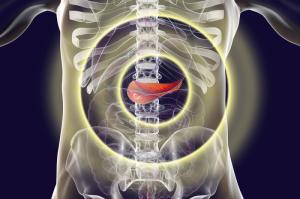by
John R. Fischer, Senior Reporter | October 22, 2018

A new algorithm could make targeting
the pancreas easier in MR radiotherapy
A 13-year-old boy in Portland, Oregon has developed a new algorithm for accurately locating and tracking the pancreas in real time during MR radiotherapy.
Rishab Jain was declared the winner of the 2018 Discovery Education 3M Young Scientist Challenge this month for his approach to enhancing treatment for pancreatic cancer, a malignancy that is challenging to treat with radiotherapy due to the difficulty involved in targeting the pancreas.
“In past years, I was deeply moved by family friends passing away from cancer. Last summer, when I visited my brother in Boston, I learned about a local laboratory that focuses on pancreatic cancer research. I discovered how deadly of a disease it is, and that it has a surprisingly low survival rate,” Jain
told the Pancreatic Cancer Action Network last month, adding that he believes “AI will revolutionize the prevention and treatment of pancreatic cancer.”



Ad Statistics
Times Displayed: 136626
Times Visited: 7924 MIT labs, experts in Multi-Vendor component level repair of: MRI Coils, RF amplifiers, Gradient Amplifiers Contrast Media Injectors. System repairs, sub-assembly repairs, component level repairs, refurbish/calibrate. info@mitlabsusa.com/+1 (305) 470-8013
The third-leading cause of cancer-related deaths, pancreatic malignancies are difficult to treat with radiation therapy due to its position in conjunction to the stomach and other nearby organs, making it hard to locate and target. Further challenges are breathing and other anatomical changes which cause it to move around the abdominal area, leading to users to inadvertently target and damage healthy tissues with radiation.
Using images of the human digestive system, Jain tested his algorithm alongside his mentor, Dr. Döne Demirgöz, a 3M corporate supply chain black belt and product development and research expert. The two found the algorithm to have a 98.9 percent success rate at detecting the pancreas.
Jain hopes that his innovation will improve accuracy and reduce invasiveness of radiotherapy to provide patients with greater quality of life and better chances of survival, and plans to pursue similar technological endeavors in his career.
“I want to study medicine and begin my career as a biomedical engineer,” he said. “This career combines the parts of technology, engineering and medicine that excite me most.”
The annual Discovery Education 3M Young Scientist Challenge is composed of children in grades 5-8 competing to design solutions for everyday problems and to improve the way humans live.
The award to Jain includes a title of “America’s Top Young Scientist” along with a $25,000 prize.
Other finalists included Mehaa Amirthalingam; Leo Wylonis; Sriram Bhimaraju; Anna Du; Julia Gelfond; Zachary Hessler; Theodore Jiang; Cameron Sharma; and Krish Wadhwani.
Back to HCB News

